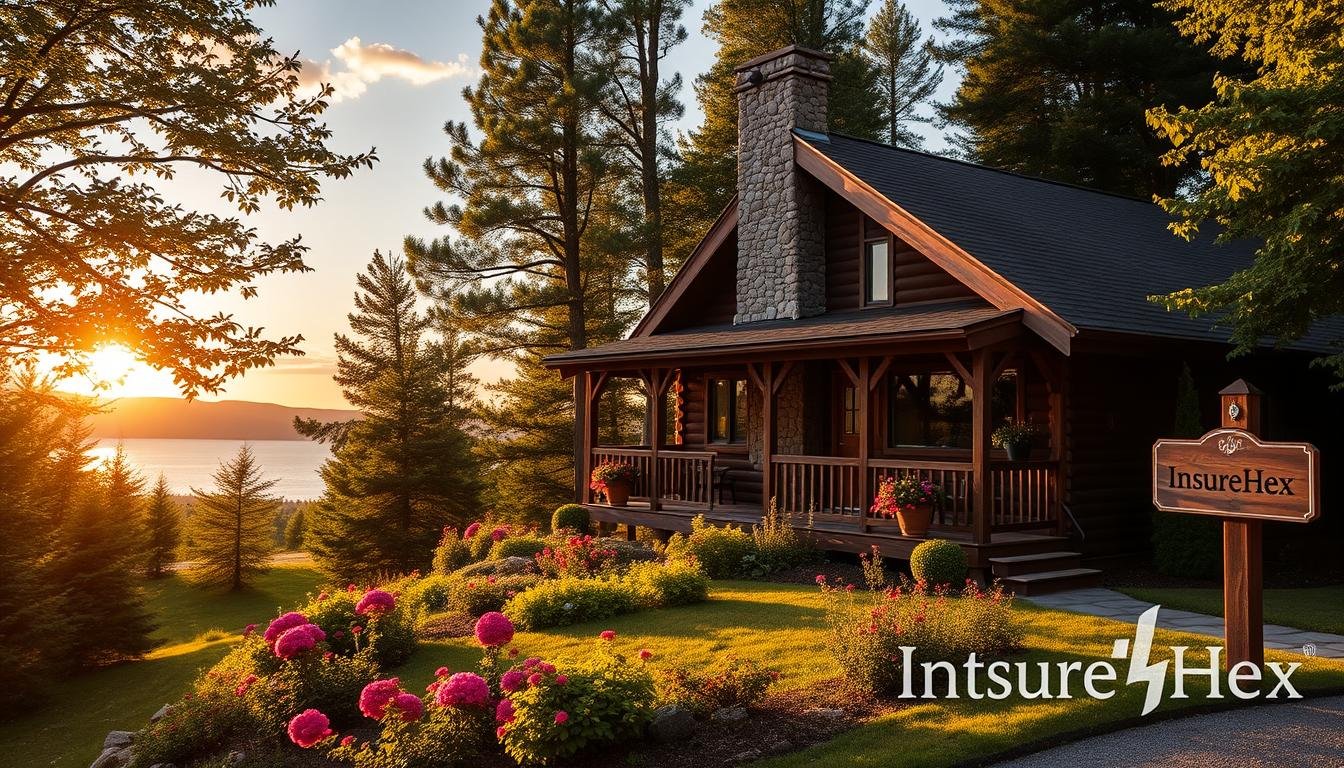Did you know the U.S. vacation home market is worth $266 billion? More Americans are buying secondary properties. This makes vacation home insurance more important than ever. We’ll explore how to protect your second home and keep your mind at ease.
Key Takeaways
- Vacation home insurance offers special coverage for your second home. It protects the building, its contents, and you from lawsuits.
- Vacation home policies are different from regular homeowners insurance. They handle the unique risks of seasonal or rental homes.
- Knowing about property and liability coverage is key to protecting your vacation home.
- Things like where your home is, how often you use it, and who lives there can change your insurance cost. Finding the right provider is crucial.
- Getting vacation home insurance with other policies, like auto or life insurance, can lower your total costs.
What is Vacation Home Insurance?
Vacation home insurance is a special kind of property coverage. It’s designed to protect your secondary or investment property, like a beach house or mountain cabin. This policy is different from a standard homeowners insurance because it deals with the unique risks of owning a vacation home.
Understanding the Basics
This insurance covers the structure of your property and your personal belongings. It also includes liability protection if someone gets hurt on your vacation property. Since vacation homes are often empty for long times, they face higher risks of damage or theft. Vacation home insurance helps protect your secondary property from these risks.
Why Vacation Homes Need Special Coverage
- Vacation homes are often unoccupied for long periods, increasing the risks of damage or theft.
- Vacation properties may be located in areas with unique risks, such as coastal regions susceptible to hurricanes or mountainous areas prone to wildfires.
- Vacation homes may be used for short-term rentals, requiring additional coverage to protect against liability and property damage.
- Vacation home insurance policies often include coverage for items like boats, ATVs, or other recreational equipment that may be kept at the property.
Owning a vacation home requires special insurance needs that standard policies can’t cover. Vacation home insurance basics and understanding the secondary property coverage needs are key to protecting your investment. This ensures your home away from home is well-protected.
Vacation Home Insurance vs. Homeowners Insurance
Protecting your secondary property requires understanding the differences between vacation home insurance and homeowners insurance. Vacation home insurance offers extra coverage for the unique risks of a second home. It’s designed for the special needs of a vacation home.
Vacation homes face more liability risks. This is because they have more visitors and a higher chance of accidents. Vacation home insurance covers more liability and can also protect rental income, which homeowners insurance usually doesn’t.
| Coverage Comparison | Vacation Home Insurance | Homeowners Insurance |
|---|---|---|
| Liability Limits | Higher liability coverage | Standard liability coverage |
| Rental Income | Covered | Typically excluded |
| Seasonal Occupancy | Addressed | May not be fully covered |
| Replacement Cost | Typically included | May require additional coverage |
Vacation home insurance also considers how often you use your home. It covers your home even when you’re not there. Homeowners insurance might not cover your home as well if it’s empty for a long time.
Choosing between vacation home insurance vs. homeowners insurance depends on your home’s needs. Knowing the differences in coverage helps you pick the right insurance. This way, you can protect your vacation home investment.
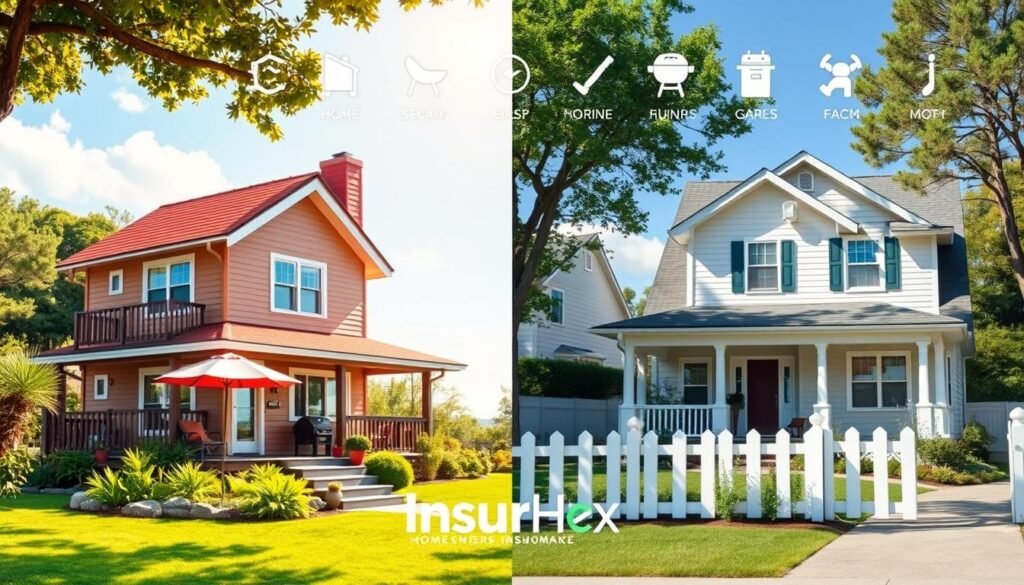
Key Coverages in a Vacation Home Insurance Policy
Protecting your vacation home is crucial. A good insurance policy is key. It offers many coverages to keep your property safe and protect you from liability.
Protecting Your Property
Vacation home insurance covers your property’s physical structure. It guards against fires, storms, vandalism, and theft. It also protects your personal belongings inside.
Think about your property’s age, condition, and special features when choosing coverage. Regularly check your policy to ensure you have the right property protection.
Liability Protection
This insurance also offers liability coverage. It helps protect you from lawsuits and claims for accidents or injuries on your property. It covers bodily injury, property damage, and legal costs.
Liability coverage is vital, whether you’re hosting guests or renting out your home. It gives you peace of mind. Knowing you’re covered helps you enjoy your vacation home without worry.
Insuring Your Vacation Rental Property
If you plan to rent out your vacation home, getting extra coverage is key. Vacation rental insurance and short-term rental coverage are great options. They help protect your investment.
Short-Term Rental Coverage
Short-term rental coverage gives your vacation home the protection it needs. It covers many risks, like:
- Damage to your property by guests
- Liability for injuries or accidents on your property
- Loss of rental income due to damage or other events
With short-term rental coverage, you can relax. You’ll know your vacation rental is safe, even when you’re not there.
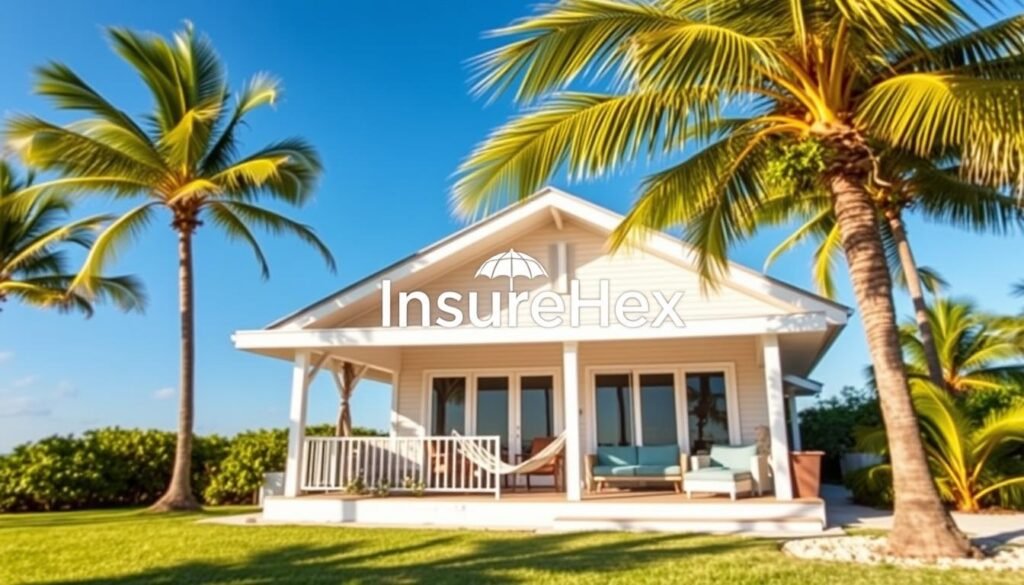
“Getting vacation rental insurance is smart for any vacation home owner. It offers vital protection and financial security for your investment.”
When picking a vacation rental insurance policy, check the coverage details. Make sure you understand what it protects. This way, your vacation rental business is well-covered and safe from risks.
Factors That Affect Vacation Home Insurance Rates
Knowing what affects vacation home insurance rates is key to protecting your investment. Several important factors can change your policy’s cost. Being aware of these can help you choose the right coverage.
The location of your vacation home is a big factor. Places prone to natural disasters like hurricanes or wildfires might have higher premiums. The age and materials of your home also matter. Older or less sturdy homes can cost more to insure.
| Factor | Impact on Insurance Rates |
|---|---|
| Location | Homes in disaster-prone areas may face higher premiums. |
| Property Age and Construction | Older or less durable homes may have higher insurance costs. |
| Rental Activity | Vacation homes used for short-term rentals may require additional coverage and incur higher rates. |
| Security Features | Homes with sophisticated security systems may be eligible for discounts. |
| Claims History | A history of claims can lead to higher insurance premiums. |
Rental activity is another key factor. If you rent out your home short-term, you might need extra coverage. This can raise your premium. But, homes with advanced security systems could get discounts.
Your claims history also matters. If you’ve filed many claims, insurers might see your home as riskier. This could mean higher premiums for you.
By understanding these factors, you can make better choices. You can find the right coverage that fits your needs and budget.
Vacation home insurance
Vacation home insurance is made for your secondary or investment property. This includes places like beach houses, lake houses, or mountain cabins. It’s different from regular homeowners insurance because it covers unique risks.
Having a vacation home means facing special challenges. You have to manage when people stay and deal with weather risks. Vacation home insurance gives your property the protection it needs. This way, you can relax and enjoy your getaway.
Key Features of Vacation Home Insurance
- Covers the structure, your stuff, and liability at your vacation home
- Protects against damage from natural disasters, theft, and vandalism
- Helps if you can’t rent out your home due to damage
- Has policies that fit your home’s seasonal use
Vacation home insurance is made for secondary properties. It’s not the same as regular homeowners insurance. This special coverage helps protect your investment and lets you enjoy your vacation home without stress.
| Feature | Vacation Home Insurance | Homeowners Insurance |
|---|---|---|
| Seasonal Occupancy | Accommodates | May not fully address |
| Short-Term Rental Coverage | Included | May not be included |
| Weather-Related Risks | Tailored policies | May have limitations |
Knowing the differences between vacation home insurance and regular homeowners insurance is key. It helps make sure your secondary property is well-protected. This way, your investment is safe.
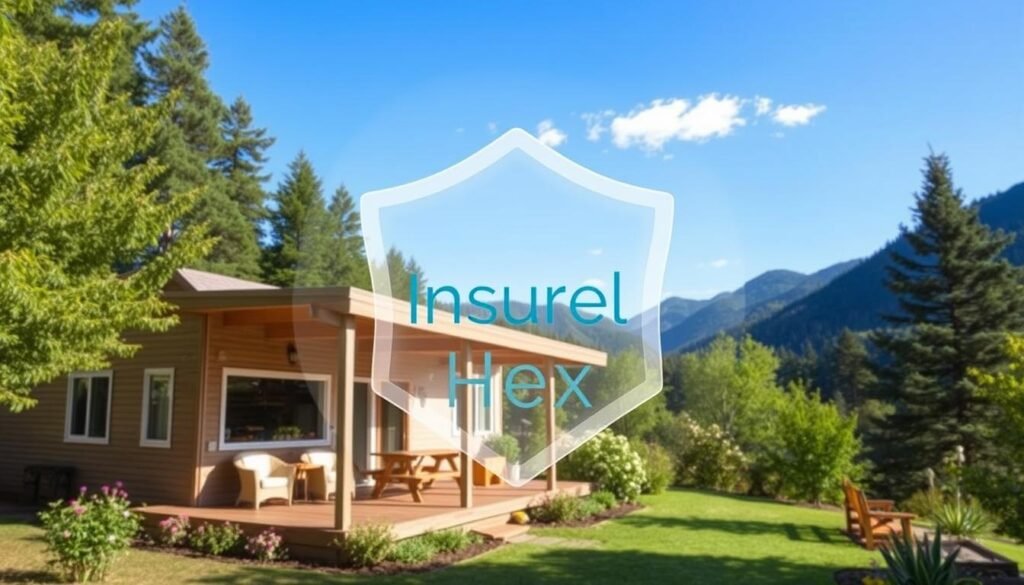
“Investing in a vacation home is a big financial step. The right insurance is crucial. Vacation home insurance offers the special protection you need to fully enjoy your getaway.”
Seasonal Occupancy and Vacancy Clauses
Vacation home insurance policies often have clauses about seasonal use and vacancy. These can greatly affect your coverage. It’s key to understand these terms and take steps to reduce risks when your home is empty.
Mitigating Risks During Off-Season
Vacant vacation homes are more at risk during the off-season. They can face damage from weather, theft, and other dangers. To lessen these risks, try these tips:
- Regularly check the property and fix any maintenance issues quickly.
- Make sure all doors, windows, and entryways are locked well. Think about getting a security system.
- Have someone you trust check the home from time to time to see how it’s doing.
- Turn off the water supply and drain the pipes to avoid freezing and water damage in cold months.
- Keep the home warm or cool enough to prevent mold or mildew.
- Get seasonal occupancy riders or vacancy clause coverage to keep your policy good when your home is empty.
By following these steps, you can protect your vacation home. This helps reduce the risks of seasonal occupancy and vacancy when it’s not being used.
“Protecting your vacation home investment during the off-season is crucial to ensuring its long-term viability and your peace of mind.”
Protecting Your Vacation Home Investment
Owning a vacation home is a big deal. It’s important to protect that investment. Vacation home insurance helps keep your secondary property safe. This way, you can enjoy your home without worrying about risks.
There are a few things to think about when protecting your vacation home. First, consider the risks it faces. These include natural disasters, theft, and vandalism. The right insurance can help cover these risks and offer financial security.
| Coverage Type | Description |
|---|---|
| Dwelling Coverage | Protects the structure of your vacation home, including the roof, walls, and foundation, in the event of damage or destruction. |
| Personal Property Coverage | Covers the replacement or repair of your personal belongings, such as furniture, electronics, and appliances, if they are damaged or stolen. |
| Liability Coverage | Provides protection if someone is injured on your property or if you’re held responsible for any damages or injuries caused by your vacation home. |
| Loss of Use Coverage | Helps cover the costs of alternative accommodations if your vacation home is uninhabitable due to a covered event. |
Understanding the different coverages can help you tailor your insurance. This way, you can protect your vacation home investment. You’ll have peace of mind when enjoying your secondary property.
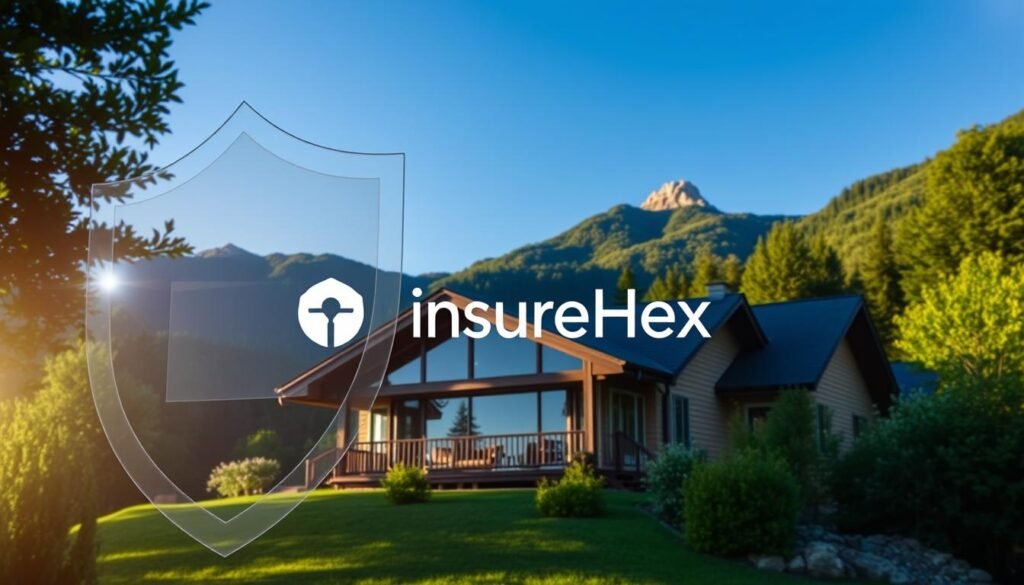
Remember, owning a secondary property has its challenges. But with the right insurance, you can protect your investment. You’ll keep making memories in your home away from home.
Secondary Property Coverage for Vacation Homes
Owning a vacation home comes with unique risks. Your primary homeowners insurance might not cover everything. That’s where vacation home insurance comes in. It offers specialized coverage for your secondary property.
These policies are made to protect your investment. They cover everything from natural disaster damages to liability claims. Vacation home insurance helps safeguard your vacation property and gives you peace of mind.
Here’s a closer look at the key benefits of secondary property coverage for your vacation home:
- Comprehensive protection for the structure, contents, and liability exposures specific to your vacation home
- Coverage for increased risks associated with extended vacancy periods or rental usage
- Specialized add-ons to address unique needs, such as hidden water damage or personal property protection
By investing in a tailored vacation home insurance policy, you can ensure your secondary property is protected. This lets you fully enjoy your home away from home.
“Vacation home insurance is an essential safeguard for your second property, providing the specialized coverage you need to protect your investment.”
Whether you’re using your vacation home as a personal retreat or a short-term rental, vacation home insurance gives you confidence. It helps you make the most of your secondary property.
Beach House Insurance: Coastal Considerations
Living by the beach is a dream for many. But, it’s important to know the special insurance needs of coastal homes. Beach house insurance must cover the extra risks of living near the sea, especially for windstorm and flood coverage.
Windstorm and Flood Coverage
Having a beach house means facing the dangers of coastal storms and rising tides. Regular homeowners insurance might not be enough. You need a beach house insurance policy that includes:
- Comprehensive windstorm coverage to protect against high winds and storm surges.
- Flood insurance to shield your home and belongings from flooding, caused by rising sea levels and extreme weather.
- Extra coverage for risks like damage from saltwater or beach erosion.
With the right insurance, you can rest easy knowing your beach house is safe. It guards your investment against the special challenges of beach living.
| Coverage | Importance for Beach House |
|---|---|
| Windstorm Coverage | Protects against high winds and storm surges common in coastal areas |
| Flood Insurance | Safeguards against flooding exacerbated by rising sea levels and extreme weather |
| Saltwater Damage Coverage | Covers damage from exposure to corrosive saltwater and beach erosion |
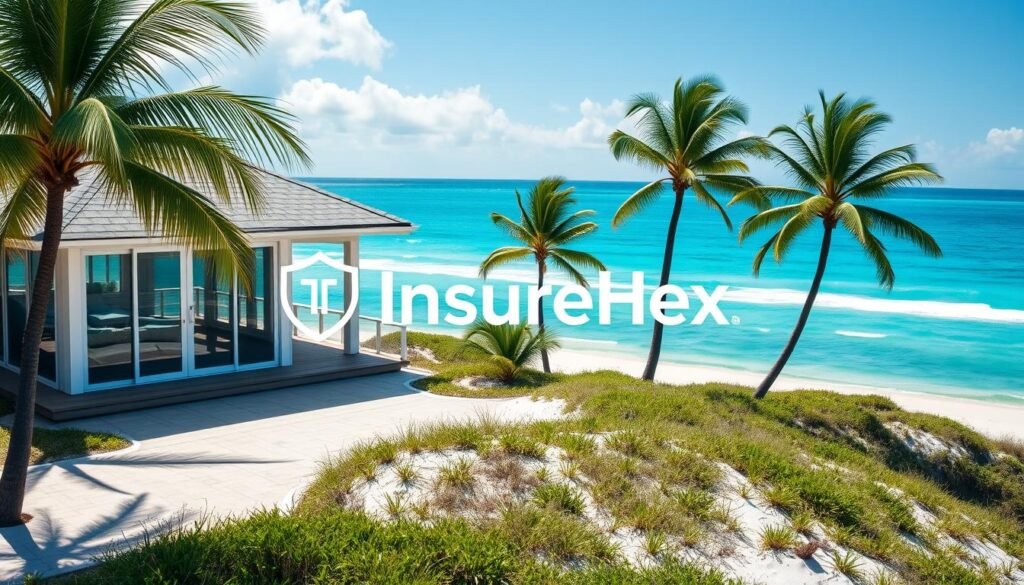
“Protecting your coastal property requires specialized insurance coverage that addresses the unique risks of a beachfront lifestyle.”
Lake House and Mountain Cabin Insurance
Owning a lakeside retreat or a secluded mountain cabin is a dream. But, it also needs special insurance. Lake house insurance and mountain cabin insurance cover unique risks of these properties.
Lake house insurance deals with water damage, boat storage, and dock coverage. Mountain cabin insurance handles risks like heavy snow, landslides, and off-season access. Getting the right secondary property coverage is key to protect your vacation home.
| Coverage Area | Lake House Insurance | Mountain Cabin Insurance |
|---|---|---|
| Water Damage | ✓ | – |
| Boat Storage | ✓ | – |
| Dock Coverage | ✓ | – |
| Heavy Snowfall | – | ✓ |
| Landslides | – | ✓ |
| Off-Season Access | – | ✓ |
Insuring your vacation home needs an experienced agent. They can help with lake house insurance or mountain cabin insurance. They ensure your secondary property is well-protected.
“Protecting your vacation home investment is crucial, and specialized insurance policies can give you the peace of mind you need to fully enjoy your lakeside or mountain getaway.”
Discounts and Cost-Saving Tips
As a vacation home owner, you might know that insuring your secondary property can be pricey. But, there are ways to cut down on your insurance costs. Looking for discounts and bundling your policies can help you get the best coverage without spending too much.
Bundling Policies for Savings
One smart way to save money is to bundle your vacation home insurance with other policies. This could be your primary home or car insurance. Many providers give discounts for customers who get all their coverage from one place. This way, you can manage your policies easily and might save some cash.
- Look for opportunities to bundle your vacation home insurance with your primary residence or auto insurance policies.
- Inquire about multi-policy discounts, which can provide savings when you insure multiple properties or vehicles with the same provider.
- Consider increasing your deductibles, as higher deductibles typically result in lower vacation home insurance premiums.
Also, keep an eye out for other cost-saving tips. Look for discounts for security systems, loyalty programs, or even professional associations. By exploring these options, you can protect your vacation home well without spending too much.
“Bundling your vacation home insurance with other policies can be an effective way to maximize your savings and simplify your insurance management.”
Choosing the Right Vacation Home Insurance Provider
Protecting your vacation home is key. Finding the right vacation home insurance provider is essential. Look at different insurance companies, their coverage, and customer service. This helps you choose the best policy for your needs.
When choosing a vacation home insurance provider, consider these factors:
- Coverage options: Make sure the provider offers full coverage for your vacation home. This includes liability, property damage, and personal belongings.
- Customizable policies: Find an insurer that lets you select the right coverage. This should depend on your home’s location, age, and use.
- Claim handling and customer service: Check how well the provider handles claims and supports customers. Good service is crucial in emergencies.
- Discounts and cost-saving opportunities: Ask about discounts for bundling policies, safety features, or insuring more than one property. This can save you money.
By researching and comparing, you can find the right insurance for your vacation home. This ensures your investment is safe and secure.
“Protecting your vacation home with the right insurance coverage is an investment in your peace of mind and the long-term value of your property.”
Vacation home insurance providers
Conclusion
Vacation home insurance is key to protecting your secondary property. It covers unique risks and offers peace of mind. By understanding what it includes and how to find the right policy, we can enjoy our vacation homes worry-free.
It’s important to choose the right coverage for our vacation home. Whether it’s a beach house, lake house, or mountain cabin, the right insurance protects it. This way, we can enjoy our second home without worry.
In short, getting vacation home insurance and knowing about secondary property coverage is crucial. It keeps our vacation home safe and lets us make more memories in our second home.

